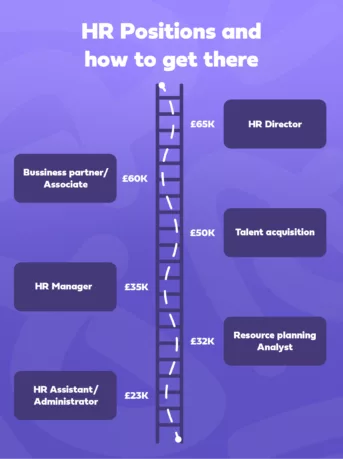A career in human resources can be a fantastic path to take if you love working with people and have a genuine interest in helping run a business well. But, while HR jobs focus on the human element of a business, they require much more than just being personable. There’s a lot of planning, negotiation and analysis that goes into ensuring job success. But the rewards can be fantastic. Below, we cover what you can expect from a career in human resources and the average HR salary, including:
- Different HR roles and responsibilities
- Average HR salaries
- What courses can you take to pursue a role in HR
- The necessary skills for an HR professional
HR roles and responsibilities
There’s more to human resources than interviewing and supporting your company’s workforce. Read on and find out what each role in human resources involves.
Human Resources Assistant/Administrator
HR assistants are predominantly involved in administrative work. The role works as an entry point into all things HR and is often used as a stepping stone to higher positions. As an HR assistant, your job will involve documenting grievances, absences, reports and holiday requests, but will also include some tasks in recruitment, interviewing and staff training.
Resource Planning Analyst
As a resource planning analyst, you will be responsible for preparing budgets, forecasting and managing staff resources, as well as scheduling recommendations for training, staff development, and new job roles. The role will include working alongside HR managers and directors, providing them with data and support for enhancing internal and external partnerships.
HR Advisor
HR advisor positions are one of the most common beyond the administrator level. These roles involve a broad scope of HR responsibilities from writing job descriptions to conducting interviews, helping with disciplining and providing training. They require high levels of organisational and administrative skills, as well as impeccable communication, conflict management and knowledge of recruitment law.
HR Manager
As an HR manager, you’ll oversee the planning, directing, and co-ordination of the whole HR process within your company. This will include top-level control of salary and benefits, team-building and development, communication between departments, training, and employer relations.
HR Director
An HR director role is similar to that of an HR manager with some slight differences. The big difference is that directors generally take more of a consultation-style position. This means you’ll take a step away from day-to-day management and provide supervision over the HR process, rather than playing an active role.
How much can you earn working in human resources?

According to the National Careers Service, HR jobs have salaries ranging from £15,000 to £50,000, depending on the role and experience of the individual. A typical starting salary for HR administrators in the UK ranges from £18,000 to £24,000. For HR Managers, according to combined data from Indeed, LinkedIn and Glassdoor, an expected average salary in 2021 is about £44,000.
The average salary in human resources overall is £36,000, but those with more experience and CIPD qualifications can expect to earn way beyond £50k per year. But be aware, that these higher-level roles and human resources salaries do come with much greater expectations and responsibilities.
Some typical salaries:
- Human Resources Assistant / Administrator: £17-23k per year
- Resource Planning Analyst: £21-32k per year
- Talent Acquisition / HR Advisor: £20-50k per year
- Human Resources Manager / Business Partner / Associate: £30-150k per year
How can you progress your career in HR?
There are numerous HR courses available both online and in classroom settings. Most important is to choose a qualification that is accredited and recognised by the industry. For this, we recommend CIPD courses. As industry leaders in HR, their courses are highly prized by employers in need of HR professionals at all levels. A Level 3 course will be suitable for those looking at entry positions, while those with prior qualifications or experience will be most suited to a Level 5 course. Read on for more information.
CIPD Level 3 Foundation Certificate in People Practice
The CIPD Level 3 Foundation Certificate provides a solid understanding of all areas of human resources. Providing you with the basics and then developing your skills further, this course gives those with limited HR or L&D experience a great entry route into the industry.
Potential HR careers and average salaries with this qualification:
- HR Administrator: £21k per year
- HR Assistant: £23k per year
CIPD Level 5 Diplomas in People Management and Organisational L&D
The CIPD Level 5 Diploma in People Management will help you build on your existing knowledge. You’ll get a sound understanding of how HR fits into achieving strategic objectives and how data can be used to improve performance. The big difference between this course and the certificate is the focus on gaining leadership and management skills and how increasing employee engagement leads to positive business outcomes. You’ll study a range of HR theories and approaches as well as how to put these into practice, boosting potential HR manager salary.
Potential roles and average HR salaries with this qualification:
- HR Analyst: £32.5k per year
- HR Advisor: £32.5k per year
- HR Business Partner: £47.5k per year
The CIPD Level 5 Diploma in Organisational L&D is the most comprehensive course available for L&D professionals, ideal for you if you want to formalise your existing experience, skills and knowledge. You’ll study the core knowledge and behaviours any People Professional needs and extend these through specific units to further specialise in your field.
Potential roles and average HR salaries with this qualification:
- L&D Manager: £47.5k per year
- Head of L&D: £57.5k per year
What are the necessary skills for HR roles?
Many people assume that working in human resources only involves helping people and making their working life easier. However, this isn’t always the case. As with every job, sometimes there are tough tasks to undertake, like delivering news about redundancies, disciplining or dealing with employee complaints.
Having a qualification can only get you so far. Doing the job well also requires certain characteristics. Therefore, it’s useful for those looking at HR jobs to know that it will help a lot if you possess the following traits:
- Organised
- Confident
- Fantastic listening skills
- Level-headed
- Able to negotiate and collaborate with people at all levels
- Good at multi-tasking
If you have these personal skills and put in the effort to gain a relevant qualification and build up your experience, you have the potential for a fulfilling career in human resources.
About Avado
At Avado, we believe that true transformation isn’t digital, it’s human. We build professional future skills to help diverse talent access and accelerate careers through award-winning learning experiences that deliver tangible and measurable impact. We upskill people, and uplift culture and future-proof organisations in a fast-moving world.
Avado is proud to be a people-transformation partner to some of the largest and most innovative organisations in the UK including Google, BT, NHS, British Airways, UK Civil Service, Legal & General and AstraZeneca.
To find out more, visit www.avadolearning.com
 6 min read
6 min read 




